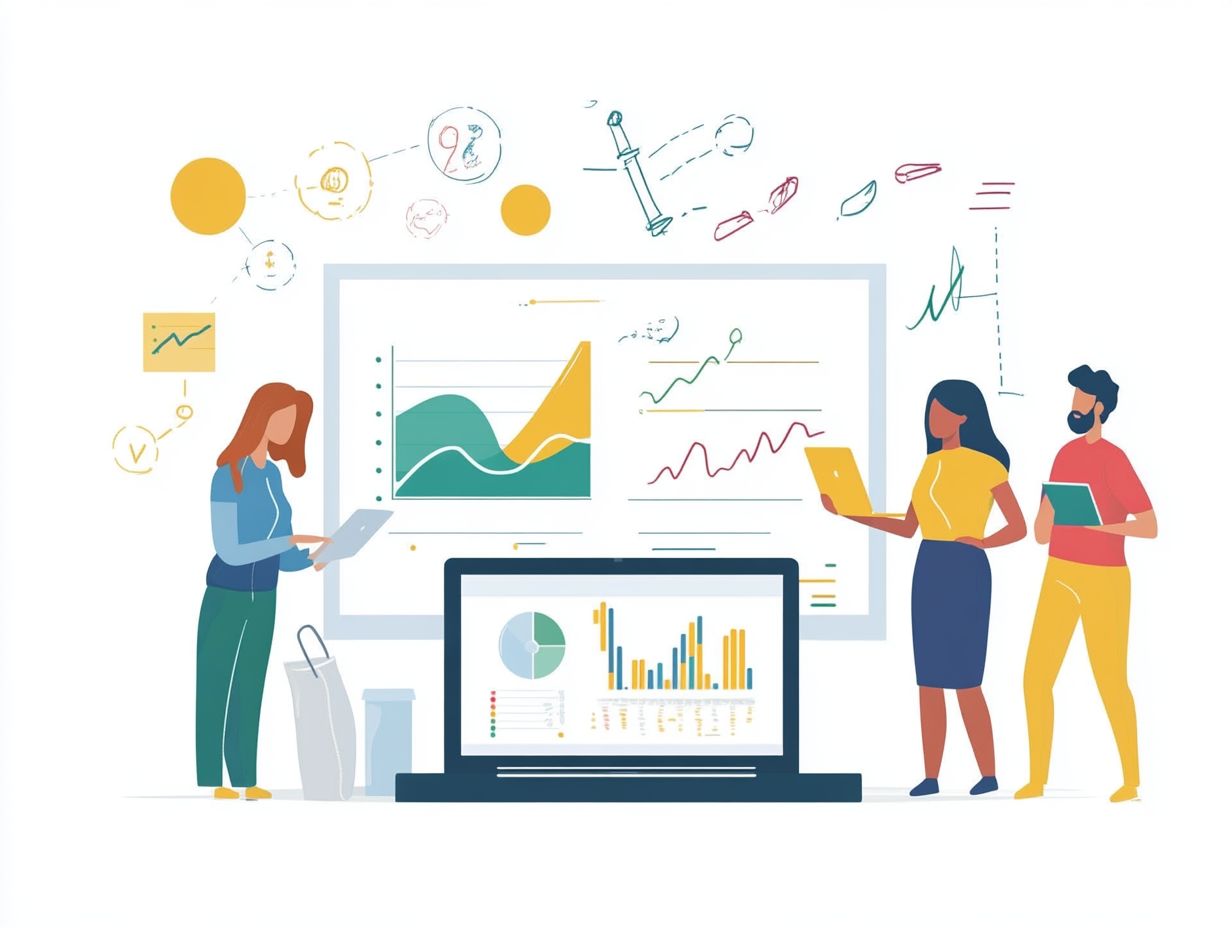Exploring Data Science: Key Concepts and Skills
Data science is revolutionizing your understanding and interaction with information, establishing itself as an essential field in today s data-driven landscape.
This article delves into the core of data science, guiding you through foundational concepts like data collection and analysis, along with advanced techniques such as machine learning.
You ll discover the vital skills necessary for your success, the array of tools available for aspiring data scientists, and the real-world applications across diverse industries.
Get ready to unlock the incredible power of data science and discover how it can transform your career!
Contents
- Key Takeaways:
- Understanding Data Science
- Key Concepts in Data Science
- Essential Skills for Data Science
- Tools and Technologies for Data Science
- Real-World Applications of Data Science
- Frequently Asked Questions
- What is Data Science, and Why Does It Matter?
- What Are the Key Concepts in Data Science?
- What Are the Essential Skills Needed for a Career in Data Science?
- What Tools and Technologies Are Commonly Used in Data Science?
- How Can I Improve My Data Science Skills?
- What Are Some Common Challenges in Data Science Projects?
Key Takeaways:

Data science is the process of extracting valuable insights from large sets of data to make informed decisions. The key concepts in data science include data collection and cleaning, analysis and visualization, and machine learning and AI.
To excel in data science, one must possess essential skills such as programming, statistics, and critical thinking, and be familiar with popular software and platforms used in the field.
Understanding Data Science
Understanding data science means grasping its complex parts, which weave together domain expertise, programming skills, and statistical knowledge. This powerful combination allows you to extract actionable insights from vast datasets.
In today s data-driven landscape, data science is essential. It enables organizations across healthcare, finance, and e-commerce to make informed decisions that enhance operational efficiency and customer satisfaction.
Using statistical techniques and machine learning, you can build models that predict user behavior and trends. This helps businesses improve their processes and gain a strategic advantage.
Defining Data Science and its Purpose
Data science is a multidisciplinary field that combines statistical analysis, programming skills, and domain expertise to extract valuable insights from data, enabling you to make data-driven decisions and strategies.
In this dynamic domain, you ll find its crucial role across sectors like healthcare, finance, and marketing, where it helps to decipher vast amounts of information.
By leveraging data analysis techniques, you can identify trends and patterns that enable organizations to make informed choices. Machine learning algorithms, which help systems learn from data and improve over time, significantly enhance decision-making processes.
Predictive modeling equips you to forecast future events based on historical data, ultimately leading to improved efficiency and strategic planning.
Integrating these components profoundly influences your problem-solving abilities and operational success.
Key Concepts in Data Science
Key concepts in data science encompass essential processes like data collection, data cleaning, exploratory data analysis, and visualization.
Each of these steps plays a vital role in transforming raw data into actionable insights, ensuring that you derive meaningful value from your data endeavors.
Data Collection and Cleaning
Data collection and cleaning are the bedrock of your data science efforts. They ensure that the datasets you analyze are accurate and relevant.
You have a range of methods at your disposal for data collection, including surveys, web scraping, and leveraging APIs, which enable you to gather diverse data formats.
However, raw data often has inaccuracies and inconsistencies that can distort your analysis results. This highlights the importance of data cleaning, where you identify and rectify errors or eliminate duplicates.
Techniques such as normalization, handling missing values, and categorizing data are key aspects of data preprocessing and wrangling. Tools like Python s Pandas, R, and SQL databases are invaluable allies in these efforts.
Following best practices, maintain a clear documentation trail and establish efficient workflows to streamline these processes, leading to more trustworthy analytics.
Dive into the world of data science and start your journey today!
Data Analysis and Visualization

Data analysis and visualization transform raw data into meaningful insights. They use statistical techniques and visual tools to uncover trends and patterns that matter.
Several methods are essential in this journey. Exploratory Data Analysis, or EDA, is the initial phase where we look at data to understand its main characteristics. This often involves visual aids like histograms or scatter plots to reveal what s really going on.
After EDA, statistical analysis delves deeper. It applies mathematical techniques to test hypotheses or identify relationships within the data.
Data visualization then serves as a powerful communication tool. It translates complex findings into clear, accessible formats, often using software such as Tableau or Power BI.
By integrating these methodologies, you can convey insights that enable thoughtful choices and drive success.
Machine Learning and Artificial Intelligence
Machine learning and artificial intelligence are key elements of data science. They enable you to develop predictive models using advanced algorithms and statistical techniques.
These technologies work together to sift through vast datasets. They uncover patterns and insights that facilitate informed decision-making.
In this field, machine learning includes various algorithm types, such as supervised, unsupervised, and reinforcement learning, each designed for specific tasks.
For example, supervised learning algorithms like regression and classification are commonly used in finance for credit scoring. Meanwhile, unsupervised learning excels in customer segmentation within marketing.
Reinforcement learning is making waves in fields like robotics and gaming. It allows machines to learn from the outcomes of their actions.
Understanding how these components work together helps you see their vital role in developing smart, evolving systems.
Essential Skills for Data Science
To excel in data science, cultivate a mix of programming skills, statistical knowledge, and domain expertise.
Honing your critical thinking and problem-solving abilities will help you navigate and tackle complex data challenges with confidence.
Programming and Coding
Programming and coding are vital skills for data scientists. Proficiency in languages like Python, R, and SQL provides a foundation for effective data manipulation and analysis.
These skills empower you to handle complex datasets confidently, utilizing the rich libraries and frameworks these languages offer.
For instance, Python comes equipped with powerful libraries such as:
- Pandas for seamless data manipulation,
- NumPy for numerical computations,
- Matplotlib for data visualization.
These tools are essential for extracting insights from messy data. Meanwhile, R excels with resources like:
- ggplot2 for creating informative graphs,
- dplyr for robust data manipulation tasks.
This makes R a favorite among statisticians. Mastering these programming languages is crucial for enhancing your analytical skills and streamlining your data-driven decision-making process.
Statistics and Mathematics
A solid grasp of statistics and mathematics is essential for data scientists. These skills form the foundation of the statistical techniques used in data analysis and model evaluation.
Mastery in statistics enables you to leverage concepts like probability distributions, hypothesis testing, and regression analysis, which are crucial for evaluating your findings.
A strong command of mathematical principles aids in optimizing models and solving intricate data challenges, resulting in more efficient algorithms.
By honing these competencies, you position yourself to make informed, data-driven decisions. This ultimately enhances your predictive capabilities and ensures robust outcomes in analytics.
Critical Thinking and Problem Solving

Critical thinking and problem-solving skills are vital for you as a data scientist. These skills enable you to analyze data insights with precision and make informed, data-driven decisions.
They help you analyze complex data, identify patterns, and pinpoint anomalies that might signal deeper issues. For example, if you notice unexpected drop-offs in user engagement, applying critical thinking will guide you to investigate potential causes, whether they involve shifts in user experience or external market influences.
Effective problem-solving strategies help you craft actionable plans, facilitate clear communication with your team, and ensure that project objectives are met collaboratively.
By transforming insights into compelling narratives, you can engage stakeholders at all levels, presenting your findings in a manner that resonates and drives impactful actions.
Tools and Technologies for Data Science
The realm of data science unfolds a rich tapestry of tools and technologies at your disposal. You can harness programming languages like Python and R, utilize robust cloud computing platforms such as AWS, and explore powerful big data frameworks like Apache Hadoop.
Each of these elements enhances your capability to analyze and interpret data, elevating your expertise in this dynamic field.
Popular Software and Platforms
Critical software and platforms in data science include programming environments like Python and R, along with database management systems such as SQL and cloud computing services like AWS. These tools are essential in your data science journey, enabling you to efficiently manage large datasets and perform intricate analyses.
Python s rich ecosystem of libraries, including Pandas and NumPy, allows for seamless data manipulation and exploratory analysis. R, with its robust statistical capabilities, enables advanced modeling and stunning visual representations, making it a top choice for statisticians.
On the database front, SQL is your go-to for querying and managing data within relational databases. Meanwhile, platforms like AWS offer scalable storage and computational power, allowing you to deploy machine learning models and visualize insights using tools like Tableau and Power BI.
With the right tools, you can take your data science skills to the next level!
Real-World Applications of Data Science
The real-world applications of data science extend across a multitude of industries, including healthcare, finance, and e-commerce. In these sectors, data-driven strategies are expertly employed to refine decision-making processes and boost operational efficiency.
Industries and Fields that Utilize Data Science
Industries such as healthcare, finance, and e-commerce harness the power of data science to extract valuable insights. They streamline processes and elevate customer experiences through strategic, data-driven approaches.
Take healthcare, for example. Here, predictive analytics plays a pivotal role in forecasting patient outcomes and refining treatment methodologies, ensuring that you receive care tailored specifically to your needs.
In the finance sector, data science is essential for credit scoring and risk assessment, enabling institutions to make well-informed lending decisions that protect their interests.
In e-commerce, algorithms analyze customer behavior, enabling personalized recommendations that enhance user engagement and drive sales.
Manufacturing sectors leverage data science for predictive maintenance, optimizing production efficiency while minimizing downtime. This shows that data-driven insights are critical across a wide array of industries.
Frequently Asked Questions

What is Data Science, and Why Does It Matter?
Data science is a multidisciplinary field that uses scientific methods, processes, algorithms, and systems to extract knowledge and insights from data. It combines statistics, computer science, and mathematics to analyze and interpret data. Understanding data science is crucial because it empowers organizations to make informed decisions, identify patterns, and gain a competitive edge.
What Are the Key Concepts in Data Science?
The key concepts in data science include:
- Data Mining: Extracting useful information from large datasets.
- Machine Learning: Using algorithms to identify patterns and make predictions.
- Data Visualization: Communicating complex data clearly.
- Predictive Modeling: Forecasting future outcomes based on data.
- Data Analysis: Inspecting and transforming data to uncover valuable insights.
What Are the Essential Skills Needed for a Career in Data Science?
Essential skills for a career in data science include strong analytical skills, proficiency in programming languages like Python and R, and knowledge of database systems and SQL. A solid understanding of statistics and mathematics is vital. Additionally, skills in organizing and preparing data (data wrangling) and conveying data insights (data storytelling) are important. Business acumen also helps in understanding the context of the data.
What Tools and Technologies Are Commonly Used in Data Science?
Common tools and technologies used in data science include:
- Programming Languages: Python, R, SQL
- Data Analysis Tools: Tableau, Excel
- Machine Learning Libraries: TensorFlow, scikit-learn
- Database Systems: MySQL, MongoDB
- Cloud Platforms: AWS, Google Cloud
How Can I Improve My Data Science Skills?
To enhance your data science abilities, take courses or attend workshops on data science topics. Practice coding and work with real-world datasets. Join data science competitions to apply your skills practically. Reading books and articles on the subject will deepen your understanding. Join online communities now to connect with fellow data enthusiasts!
What Are Some Common Challenges in Data Science Projects?
Common challenges in data science projects include:
- Data quality and availability
- Selecting the right algorithms and techniques
- Managing and analyzing large datasets
- Communicating complex findings to non-technical stakeholders
- Lack of domain knowledge and incorrect assumptions
- Ethical concerns related to data privacy and bias






